Several female photographers interviewed by AyiboPost describe their solitude in a « male-dominated profession, » as well as the specific violence they face in their line of work.
With a camera in hand, Saphira Orcel documented, on August 12, 2023, for the Haitian Times and Passion Infos Plus, Liliane Pierre-Paul’s funeral proceedings, one of the few prominent female journalists in Haiti.
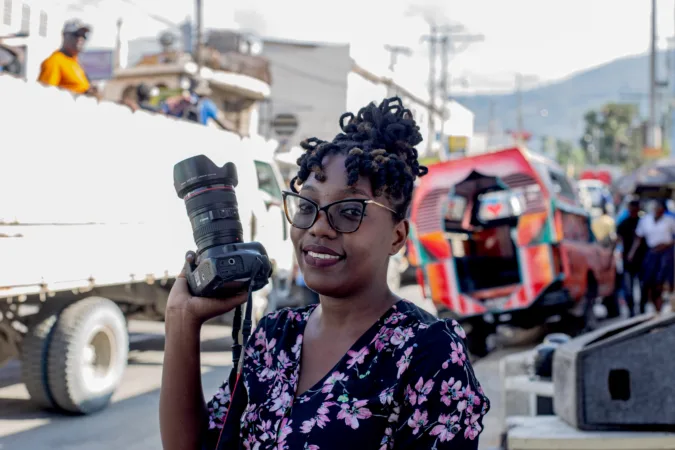
The photojournalist Saphira Orcel during a report on the road to Nazon, in Port-au-Prince, on October 18, 2023. | © David Lorens Mentor/AyiboPost
The images captured by Orcel, sober yet powerful, hide two facts.
Firstly, an obvious truth: Saphira Orcel was nearly alone in an ocean of male photographers. But even more seriously, she recounts facing a lack of professionalism among her colleagues.
« I was the subject of discriminatory remarks directly targeting my femininity, to remind me that my place was not there, » testifies the photojournalist to AyiboPost.
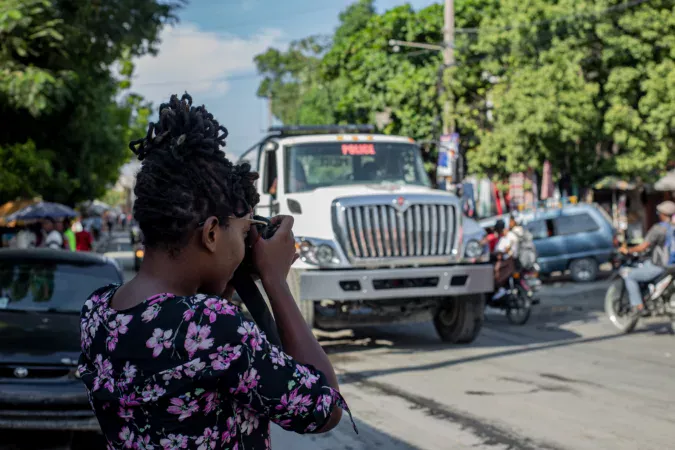
The photojournalist Saphira Orcel during a report on the road to Nazon, in Port-au-Prince, on October 18, 2023. | © David Lorens Mentor/AyiboPost
This is not a trivial matter. Six female photojournalists interviewed by AyiboPost describe their solitude in a « male-dominated profession, » as well as the specific violence they face in their line of work—a danger that seems to intensify when it comes to women.
Read also: Perspective | Pourquoi si peu de femmes dans la presse en Haïti ?
Edine Célestin has been practicing photojournalism since 2011. It’s a « difficult » profession, as the founder of Enfo Sitwayen openly admits. « There are times when individuals make inappropriate comments about my body, seeing how I position myself [to take photos], » explains the founding member of Kolektif 2 Dimansyon, a group of photojournalists.
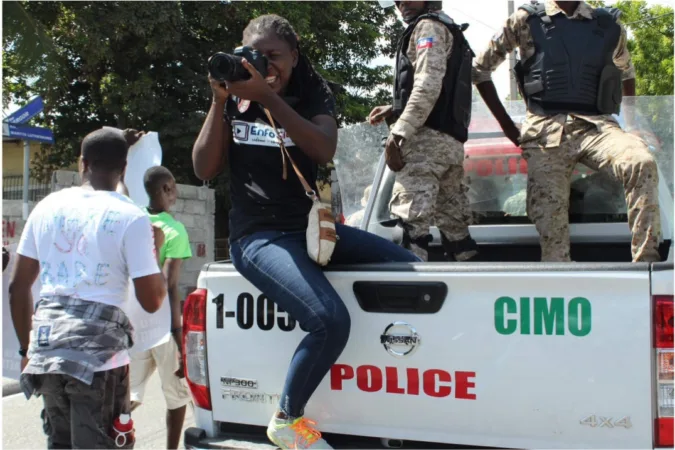
The photojournalist Edine Célestin during a report in Nazon, Port-au-Prince, in September 2018, during a demonstration demanding the Petrocaribe trial.| © David Lorens Mentor/AyiboPost
At times, the violence comes from the authorities. Fabienne Douce made a name for herself in photography in 2008, before transitioning to photojournalism in 2011.
In 2018, while Douce was covering Carnival in Champ-de-Mars, a police officer insulted her. « The verbal insult was explicit and rooted in my being female, » testifies the photojournalist, also a member of Kolektif 2 Dimansyon.
In this profession brimming with male talent, one woman stands out for her vast expertise in photography over many years. Emmeline Désert has devoted 42 years of her life to the art of photography.
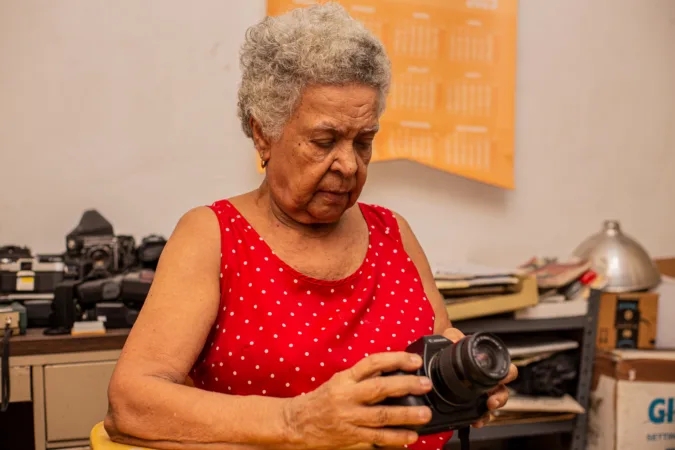
The photographer Émeline Désert, director of the Center for Photographic and Cinematographic Studies (CEPEC), a school with over 40 years of existence, in her office at the institution’s headquarters in Lalue, Port-au-Prince, on September 28, 2023. | © David Lorens Mentor/AyiboPost
Her career began in Lyon, France, and reflects a passion that has been with her since her youth. Thanks to her education in France, she has always regarded photography as a unique vocation. For her, photography transcends mere image capture; it’s a profession in itself, an art form, and a means of capturing the beauty of the world around her.
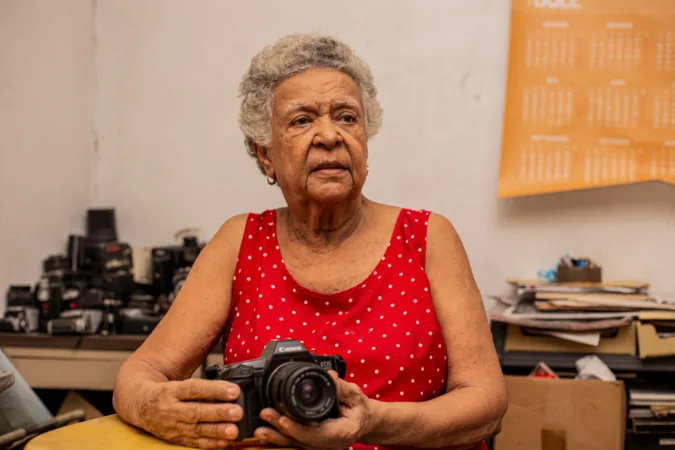
Photographer Émeline Désert in an interview with AyiboPost in her office at the CEPEC headquarters in Lalue, Port-au-Prince, on September 28, 2023. | © David Lorens Mentor/AyiboPost
Her dedication to this art form hasn’t been limited to her own career. In 1977, she took the visionary initiative to establish the Center for Photographic and Cinematographic Studies (CEPEC), a photography school that has seen significant success.
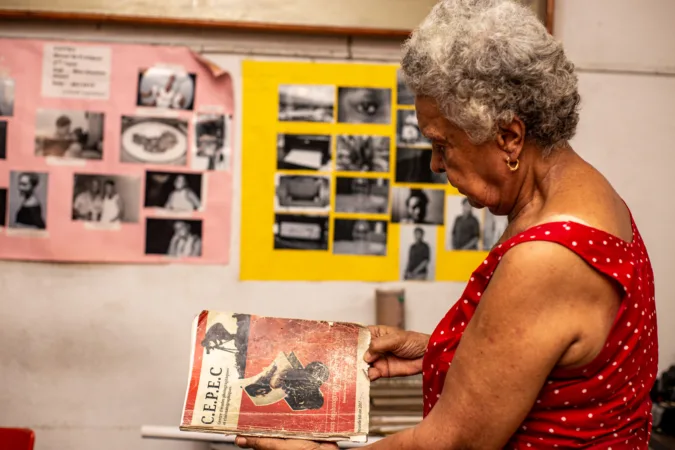
The photographer Emmeline Désert is consulting a photography course manual at CEPEC. | © David Lorens Mentor/AyiboPost
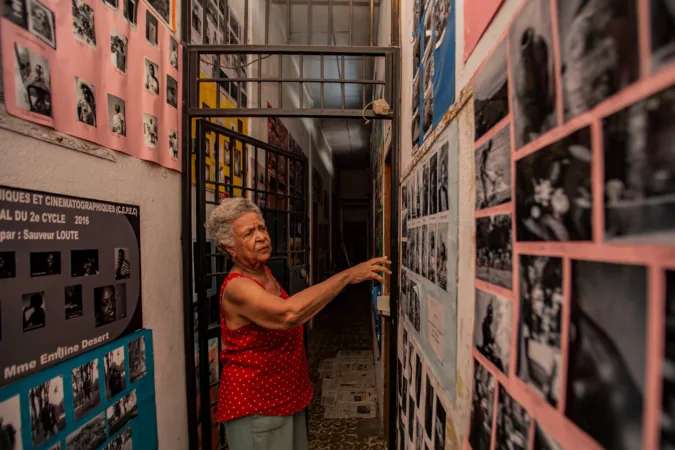
The photographer Emmeline Désert describes the photos in the CEPEC space. | © David Lorens Mentor/AyiboPost
Since January 15, 1977, CEPEC has trained and inspired generations of aspiring photographers. “I take pride in the numerous cohorts of talented students that have passed through my school and succeeded in this profession”, she says.
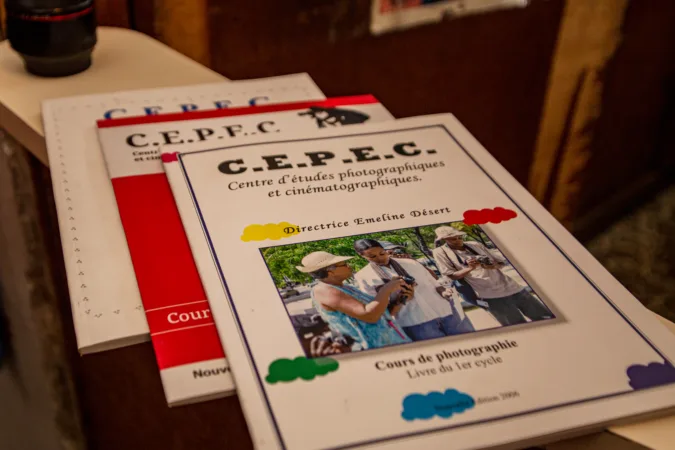
Photography course manuals prepared by the director and teacher Emmeline Désert for her students at CEPEC. | © David Lorens Mentor/AyiboPost
For Désert, photography is much more than just a profession; it’s a deep passion, a means of expression, and a legacy that she enthusiastically passes on. “Photography is an art that should be accessible to all, regardless of gender,” she adds.
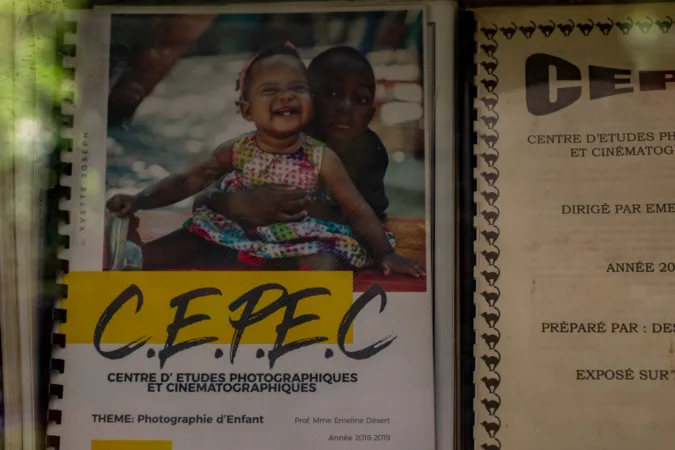
Cover photo of a photography course manual from CEPEC prepared by Emmeline Désert, director and instructor. | © David Lorens Mentor/AyiboPost
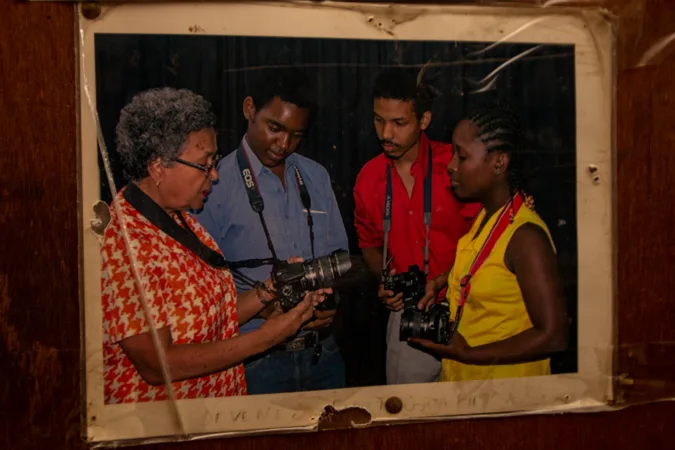
Photograph of Professor Emmeline Désert imparting her knowledge in the field to her students at CEPEC. | © David Lorens Mentor/AyiboPost
The profession remains challenging. In addition to these challenges, female photojournalists often work in underprivileged newsrooms without a proper framework to protect them from harassment, sometimes of a sexual nature, by members of the media.
It is to raise awareness about these issues, to offer training sessions and highlight the work of women journalists and photographers that Mondésir Sarah Joseph took the initiative to found the Association of Women Photographers of Haiti (AFPHA) in 2022. This is the country’s very first structure dedicated to women in the field of photography.
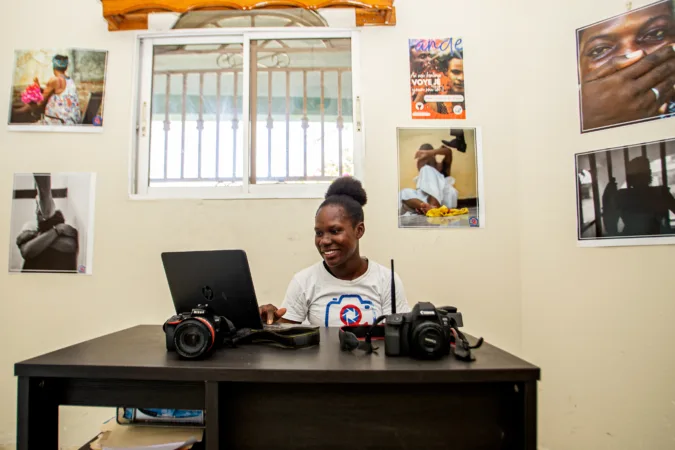
The photographer Mondésir Sarah Joseph, founder of the Association of Women Photographers of Haiti (AFPHA), in her office at the institution’s headquarters in Delmas 48, on September 26, 2023. | © David Lorens Mentor/AyiboPost
According to Joseph, « a photographer practicing her profession [in Haiti] is exposed to various forms of violence, including rape and theft, making practically impossible any movement in complete safety. »

A view of the headquarters of the Association of Women Photographers of Haiti (AFPHA) in Delmas 48, on September 26, 2023. | © David Lorens Mentor/AyiboPost
Stephanie François is the vice-president of AFPHA. According to her, the gender imbalance in the profession requires attention and actions to promote the inclusion of women.
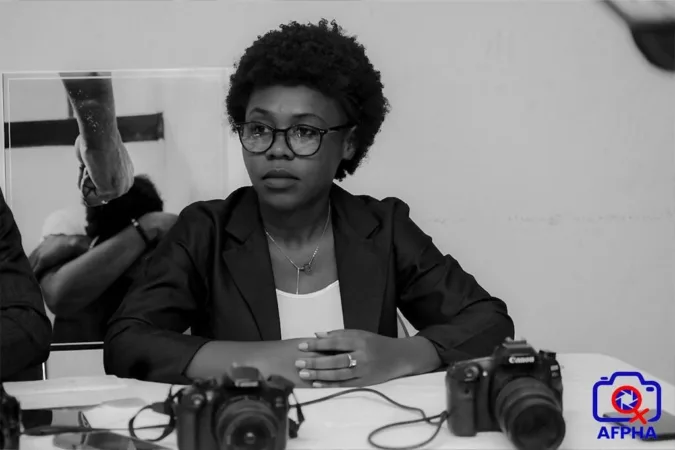
The photographer Stéphanie François, vice-president of the Association of Women Photographers of Haiti (AFPHA), during the official launch of the organization on August 19, 2023, in Delmas 48. | © AFPHA
Edine Célestin is more categorical. « I believe, » she says, « that women should assert themselves and take up the positions that they think should be theirs. »
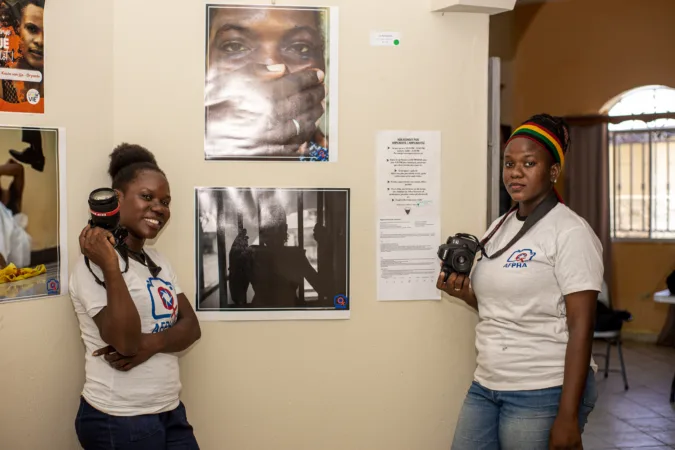
The photographers Mondésir Sarah Joseph and Museau Christianne, respectively president and spokesperson of AFPHA, at the association’s headquarters in Delmas 48, on September 26, 2023.| © David Lorens Mentor/AyiboPost
By Lucnise Duquereste & David Lorens Mentor.
English translation by Sarah Jean.
Cover Image: Photojournalist Saphira Orcel during a report in Port-au-Prince, October 18, 2023. | © David Lorens Mentor/AyiboPost.
Watch our special report filmed in March 2021 with wildlife photographer René Durocher practicing his profession in Haiti:
Stay in touch with AyiboPost through :
► Our WhatsApp channel : click here
► Our WhatsApp Community : click here
► Our Telegram canal : click here






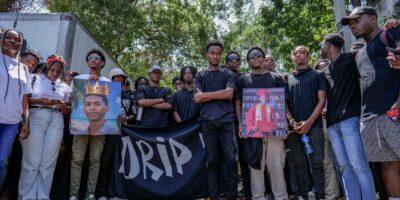
Comments